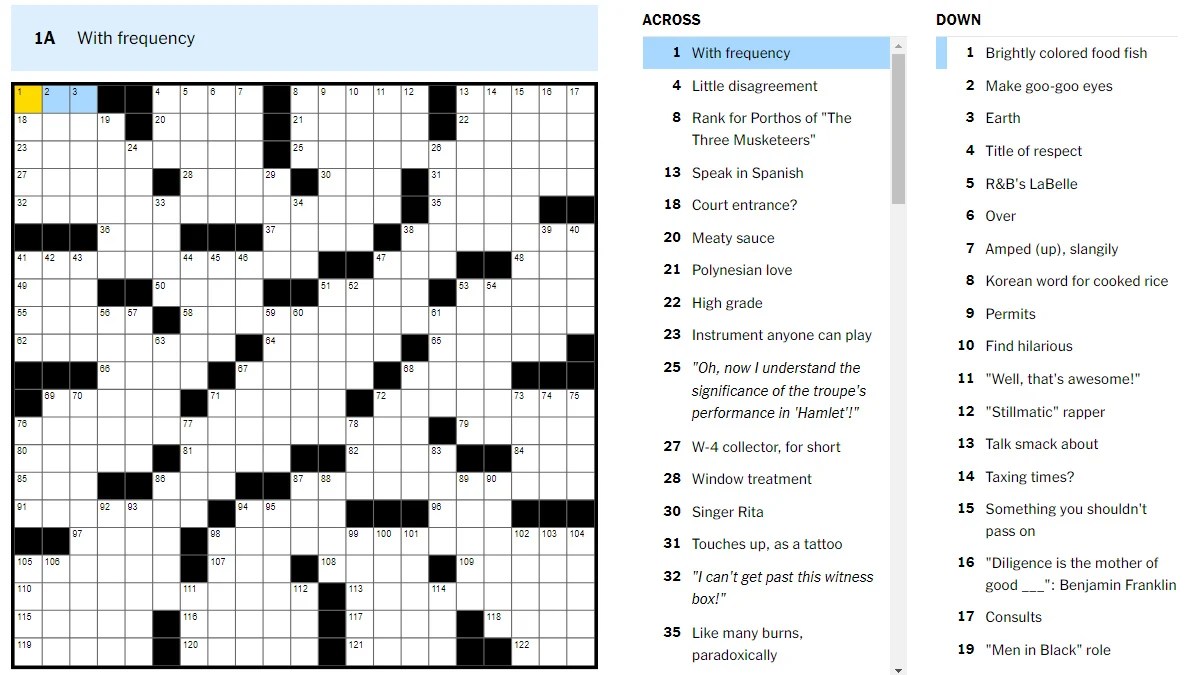Unlock Your Mind: The World of NYT Crosswords
Have you ever experienced the thrill of filling in that last square in a challenging word puzzle, a sense of accomplishment washing over you? That's the allure of crosswords, and none are more celebrated than those gracing the pages of The New York Times. But these aren't just games; they're mental workouts disguised as entertainment, puzzles that challenge your vocabulary, trivia knowledge, and lateral thinking skills.
The New York Times crossword puzzles have become a cultural phenomenon, a daily ritual for countless enthusiasts worldwide. From seasoned solvers who can conquer the Saturday behemoth to newcomers dipping their toes into the Monday grid, there's a puzzle for everyone. This article delves into the captivating world of NYT crosswords, exploring their history, intricacies, and the myriad benefits of embracing these brain-boosting challenges.
The history of crosswords is intertwined with The New York Times, with the newspaper playing a pivotal role in popularizing these puzzles in the United States. While the first crossword-like puzzle appeared in England in the 19th century, it was the publication of a word puzzle called a "Word-Cross" in the New York World in 1913 that truly ignited the crossword craze. The New York Times initially resisted the trend, deeming crosswords frivolous, but eventually succumbed to public demand, introducing its first regular crossword puzzle in 1942.
Since then, NYT crosswords have evolved significantly, with renowned puzzle masters like Margaret Farrar, the first crossword editor for The New York Times, shaping the puzzle's format and difficulty levels. Today, these puzzles are known for their clever themes, challenging clues, and inclusion of cultural references, current events, and wordplay. The puzzles progressively increase in difficulty throughout the week, with Monday offering a gentle entry point for beginners and Saturday presenting a formidable challenge even for seasoned solvers.
But what makes NYT crosswords so compelling? It's the unique blend of mental exercise, entertainment, and the satisfaction of solving a complex puzzle. Solving a crossword requires a diverse skill set. You need a strong vocabulary, a knack for deciphering cryptic clues, and a broad general knowledge encompassing history, geography, science, literature, and pop culture. The puzzles often employ wordplay, anagrams, and puns, requiring solvers to think outside the box and approach clues from different angles.
Advantages and Disadvantages of NYT Crosswords
| Advantages | Disadvantages |
|---|---|
| Improves vocabulary and verbal fluency | Can be frustrating if unfamiliar with certain topics or clues |
| Enhances cognitive skills and memory | Time-consuming, especially for challenging puzzles |
| Provides a sense of accomplishment and reduces stress | Potential for errors and getting stuck on certain clues |
Beyond the pure enjoyment of solving a puzzle, NYT crosswords offer numerous cognitive benefits. Regularly engaging with these puzzles can enhance your vocabulary, improve memory recall, and sharpen problem-solving skills. The act of searching for answers, making connections between clues, and filling in the grid stimulates different areas of the brain, promoting mental agility and flexibility. Studies have even suggested that engaging in brain-stimulating activities like crosswords may help delay age-related cognitive decline.
For many, NYT crosswords are more than just a pastime; they're a cherished ritual, a way to unwind, challenge themselves, and expand their horizons. Whether you're a seasoned solver or a curious beginner, the world of NYT crosswords offers a stimulating and rewarding experience. So, grab a pencil, open the newspaper, and embark on your next crossword adventure. You might be surprised by what you learn and the mental agility you unlock along the way.
That thumping ac noise driving you crazy find solutions here
Flipping text in word a comprehensive guide
Clean water at your fingertips the home water filter guide




